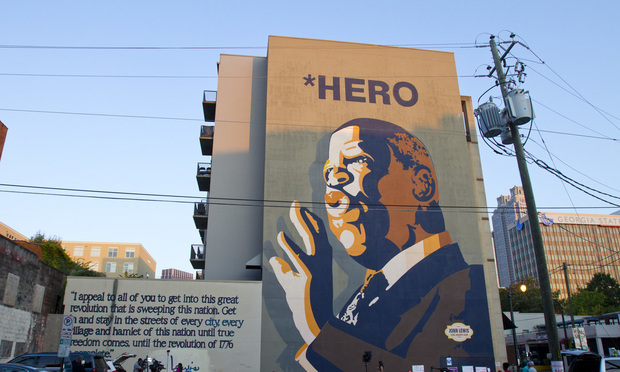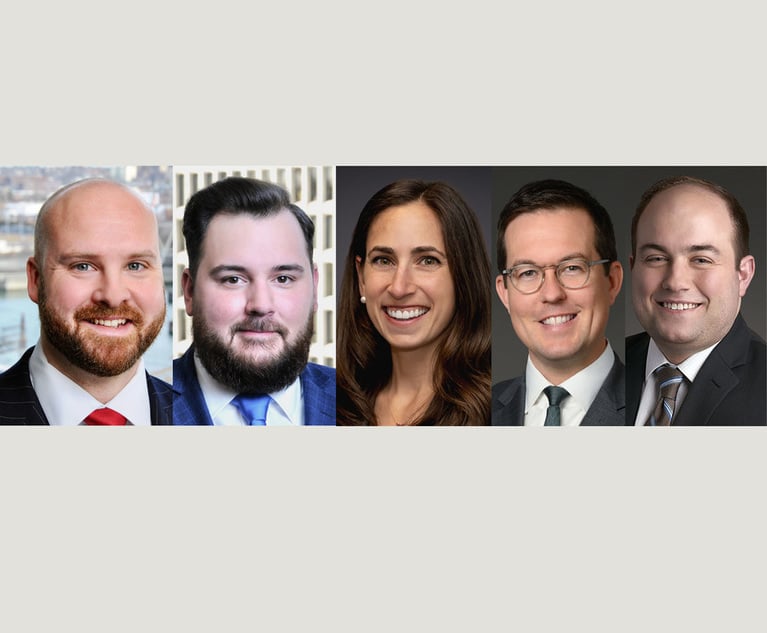Looking Back: A Connecticut Connection With Civil Rights Icon John Lewis
The late congressman made a series of speeches in Connecticut and New England in 2012, including an address to the Connecticut Bar Association.
July 20, 2020 at 01:50 PM
6 minute read
 The John Lewis Mural on Auburn Ave., Atlanta, Georgia.
The John Lewis Mural on Auburn Ave., Atlanta, Georgia.
Editor's note: As the nation mourns the loss of late Congressman John Lewis, we turn the clock back to May 2012, when lawyer-writer Thomas Scheffey, a current member of the Connecticut Law Tribune's editorial board, interviewed the famed civil rights leader ahead of several speaking engagements, including an address to the Connecticut Bar Association to conclude a year-long presidential series on equal protection.
U.S. Rep. John Lewis was one of the 13 original Freedom Riders in the Civil Rights movement to end institutionalized racial segregation. At 23, he was also the youngest speaker at the 1963 march on Washington, D.C., in which Dr. Martin Luther King delivered his "I Have a Dream" speech.
Lewis earned his place among the movement's leader by leading protest marches that were intended to be peaceful but often ended in violence at the hands of Alabama state troopers. His skull was fractured and he was repeatedly left unconscious and gravely injured. He still bears visible scars. On 24 occasions, he was arrested; at one point, he was imprisoned for 40 days.
This spring, he will be speaking to graduating classes of law schools in Connecticut, New Hampshire and Rhode Island. He's also scheduled to speak in Hartford on May 20 at the Faith Congregational Church at 2 p.m. That speech, which is open to the public, caps the Connecticut Bar Association's series on Equal Protection.
A congressman from Atlanta since 1986, Lewis remains a champion of voter rights and equality, recently unveiling the Voter Empowerment Act to counter state efforts to discourage registration and voting. Lewis recently spoke about his history and vision for the future with Senior Writer Thomas B. Scheffey.
LAW TRIBUNE: Lawyers, spiritual leaders and men of the cloth have all played a role in major independence and civil rights movements. Ghandi himself started out as a lawyer. Had you ever been tempted to go into law?
JOHN LEWIS: I thought about it during the height of the Civil Rights movement. I studied for the ministry, but as I left to work full time with the Student Nonviolent Coordinating Committee, and later with the Voter Education Project, I thought about going to law school. I met a lot of wonderful lawyers, and if it hadn't been for these men and women of the bar, I don't know what would have happened to many of us during that period.
LAW TRIBUNE: You're speaking this spring at several law school commencements. What do you have to say to lawyers as they begin their careers?
LEWIS: Lawyers are individuals who seek justice, and where there's justice, there's a sense of peace and order. We needed lawyers in the civil rights movement in what we brought about – a non-violent revolution under the rule of law. We needed lawyers protecting our civil rights to protest; the right to dissent; freedom of assembly; the right of a person to speak his or her mind; the freedom to worship. In many places in the South in the 1960s, when you spoke up and tried to exercise your First Amendment rights, people arrested us. At times we were beaten and left bloody. But the lawyers defended us, and made it possible for us to sit in at a lunch counter, or stand at the front of a theater, or to march for the right to vote.
LAW TRIBUNE: At the early part of the Civil Rights Movement, you were battling poll taxes and improper examination requirements to become a voter — and those things seem well in our past. But right now, in Congress, you're sponsoring legislation to overcome a whole series of obstacles facing today's voters.
LEWIS: There are forces in America that want to take us back to another period. It may not be an overt form of a poll tax or literacy test. People are not being beaten or trampled by horses. It's way more sophisticated. You may be required to have a photo ID, or you can't have extended periods or early voting. It's still an ongoing struggle to create a more perfect union.
LAW TRIBUNE: You have a new book coming out, called Across That Bridge, Life Lessons and a Vision for Change.
LEWIS: These are lessons I've learned from my years of involvement in the Civil Rights movement. We deal with persons of love, faith, peace, patience and reconciliation. The movement was about bringing people together to be reconciled, to have the ability to forgive and come together. Under the rule of law, that's one of the things that we try to do.
LAW TRIBUNE: What is the basic message you'll be conveying in your tour of New England?
LEWIS: We're one people, we're one family. We all live in the same house, and it's not just the American house, but it's the world house. And as Dr. King said, we have to learn to live together as brothers and sisters or we'll perish as fools. Lawyers and people of good will can play a major role in building this sense of community, this sense of one family.
LAW TRIBUNE: The most recent civil rights battle, one in which New England has been particularly progressive, has been for the rights of same-sex couples. Do you get a sense of optimism about the pace of change in America, in terms of equality of human rights?
LEWIS: I'm very hopeful, very optimistic. There may be setbacks, there may be interruptions. But you have to take the long, hard look. You have to be hopeful. You cannot get lost in a sea of despair…. You have to have the strength to keep pushing, to keep pulling, and to be hopeful. I will be saying to the young people, and the people not so young, you have to be willing to get in the way.
When I was growing up, I kept seeing signs saying "Colored Men," "White Men." I asked my parents and grandparents, and they would tell me over and over again, "Don't get in the way, don't get into trouble." But Dr. King and Rosa Parks inspired me to get into trouble. And reading the lessons of Gandhi, and the lessons of Thoreau and civil disobedience, I was inspired to get into what I call good trouble, necessary trouble.
LAW TRIBUNE: And where has that led you to now?
LEWIS: I think as a society, we must move toward a society that is free of violence. Free of hate. Hate is too heavy a burden to bear. We have to come together to look out for each other, and to support each other. In the final analysis, we are one people, one community, the American house and the world house.
This content has been archived. It is available through our partners, LexisNexis® and Bloomberg Law.
To view this content, please continue to their sites.
Not a Lexis Subscriber?
Subscribe Now
Not a Bloomberg Law Subscriber?
Subscribe Now
NOT FOR REPRINT
© 2025 ALM Global, LLC, All Rights Reserved. Request academic re-use from www.copyright.com. All other uses, submit a request to [email protected]. For more information visit Asset & Logo Licensing.
You Might Like
View All

Apple Disputes 'Efforts to Manufacture' Imaging Sensor Claims Against iPhone 15 Technology

New Partners at Cummings & Lockwood, Carmody Torrance Sandak & Hennessey
2 minute read
Trending Stories
- 1$5 Million Settlement Reached With Stone Academy
- 2$15K Family Vacation Turned 'Colossal Nightmare': Lawsuit Filed Against Vail Ski Resorts
- 3Prepare Your Entries! The California Legal Awards Have a New, February Deadline
- 4DOJ Files Antitrust Suit to Block Amex GBT's Acquisition of Competitor
- 5K&L Gates Sheds Space, but Will Stay in Flagship Pittsburgh Office After Lease Renewal
Who Got The Work
Michael G. Bongiorno, Andrew Scott Dulberg and Elizabeth E. Driscoll from Wilmer Cutler Pickering Hale and Dorr have stepped in to represent Symbotic Inc., an A.I.-enabled technology platform that focuses on increasing supply chain efficiency, and other defendants in a pending shareholder derivative lawsuit. The case, filed Oct. 2 in Massachusetts District Court by the Brown Law Firm on behalf of Stephen Austen, accuses certain officers and directors of misleading investors in regard to Symbotic's potential for margin growth by failing to disclose that the company was not equipped to timely deploy its systems or manage expenses through project delays. The case, assigned to U.S. District Judge Nathaniel M. Gorton, is 1:24-cv-12522, Austen v. Cohen et al.
Who Got The Work
Edmund Polubinski and Marie Killmond of Davis Polk & Wardwell have entered appearances for data platform software development company MongoDB and other defendants in a pending shareholder derivative lawsuit. The action, filed Oct. 7 in New York Southern District Court by the Brown Law Firm, accuses the company's directors and/or officers of falsely expressing confidence in the company’s restructuring of its sales incentive plan and downplaying the severity of decreases in its upfront commitments. The case is 1:24-cv-07594, Roy v. Ittycheria et al.
Who Got The Work
Amy O. Bruchs and Kurt F. Ellison of Michael Best & Friedrich have entered appearances for Epic Systems Corp. in a pending employment discrimination lawsuit. The suit was filed Sept. 7 in Wisconsin Western District Court by Levine Eisberner LLC and Siri & Glimstad on behalf of a project manager who claims that he was wrongfully terminated after applying for a religious exemption to the defendant's COVID-19 vaccine mandate. The case, assigned to U.S. Magistrate Judge Anita Marie Boor, is 3:24-cv-00630, Secker, Nathan v. Epic Systems Corporation.
Who Got The Work
David X. Sullivan, Thomas J. Finn and Gregory A. Hall from McCarter & English have entered appearances for Sunrun Installation Services in a pending civil rights lawsuit. The complaint was filed Sept. 4 in Connecticut District Court by attorney Robert M. Berke on behalf of former employee George Edward Steins, who was arrested and charged with employing an unregistered home improvement salesperson. The complaint alleges that had Sunrun informed the Connecticut Department of Consumer Protection that the plaintiff's employment had ended in 2017 and that he no longer held Sunrun's home improvement contractor license, he would not have been hit with charges, which were dismissed in May 2024. The case, assigned to U.S. District Judge Jeffrey A. Meyer, is 3:24-cv-01423, Steins v. Sunrun, Inc. et al.
Who Got The Work
Greenberg Traurig shareholder Joshua L. Raskin has entered an appearance for boohoo.com UK Ltd. in a pending patent infringement lawsuit. The suit, filed Sept. 3 in Texas Eastern District Court by Rozier Hardt McDonough on behalf of Alto Dynamics, asserts five patents related to an online shopping platform. The case, assigned to U.S. District Judge Rodney Gilstrap, is 2:24-cv-00719, Alto Dynamics, LLC v. boohoo.com UK Limited.
Featured Firms
Law Offices of Gary Martin Hays & Associates, P.C.
(470) 294-1674
Law Offices of Mark E. Salomone
(857) 444-6468
Smith & Hassler
(713) 739-1250










